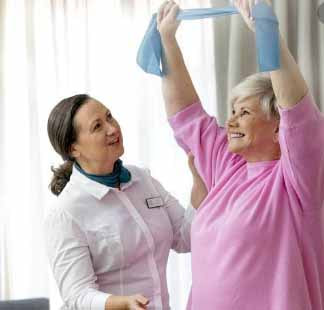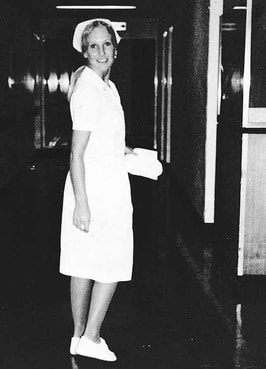| Bass Post Post: Are you surprised at the rapid spread of COVID through aged care homes? Sophie Cuttriss: Not at all. This vulnerable and highly flawed sector was already a disaster waiting to happen. Take poorly trained staff who are overwhelmed by their workload and not supervised by nurses, poor or inadequate infection control training, limited personal protective equipment. Add a large number of frail older people with various co-morbidities. What could possibly go wrong? |
| We heard about the rapid spread of COVID in a Sydney aged care facility as well as those in the UK, USA and Europe. We all knew this was going to be our biggest infection risk. The Australian Nurses and Midwifery Federation reports that many aged care facilities dealing with COVID cases are understaffed. “The workers who are there are in many cases doing the best they can, with little support, few resources and limited recognition by providers and more broadly within the public domain.” The Australian Federal Government has been warned for years about aged care and they were warned about the risks associated with COVID 19. Despite this information, they failed to deliver or implement an appropriate or timely response. COVID deaths in aged care make up 68 per cent of all COVID fatalities in Australia, the second highest rate in the world after Canada. |

There have been warnings for many years from within and outside the aged care industry. I was one of many who wrote detailed submissions to the Productivity Commission report on Caring for Older Australians in 2011.
I wrote almost exactly the same information in my submission to the Royal Commission into Aged Care Quality and Safety in 2019.
The Federal government has repeatedly been warned by aged care experts as well as families and staff who have witnessed this for decades.

I worked as a ward assistant at a residential aged care facility (RACF) during my summer holidays in the early 1970s. I was 16 and completely untrained and unqualified. Those were the days when anyone could operate an aged care home and no qualifications or experience were required to work there. But I was lucky to working at Kingston Centre with wonderful old fashioned registered nurses to inspire and guide me.
During my general nurse training in 1975-78, I recall seeing elderly people admitted to the Royal Melbourne Hospital, needing urgent medical care after being neglected in the aged care homes where they lived.
I will never forget an old woman who had been tied to a toilet chair all day, for many months. She had a ring of pressure wounds around her sacrum and buttocks. Those wounds were so deep that bone was visible.
These were the bad old days.
In 1997 the Federal Government enacted The Aged Care Act to address these issues. It includes the aged care standards to prescribe all aspects of necessary care, aged care complaints mechanism, minimum qualifications required and a funding instrument to access Commonwealth funding for each person in aged care.
It was intended to improve care and increase accountability.
It has been evident for a long time that this Act is overdue for review.
Some residential aged care facilities (RACFs) provide excellent care with well trained staff but this is not the case in many, particularly in the private sector.
My aged care experience includes working with a nurse advisory company that attended residential aged care facilities that had not passed their Commonwealth accreditation process and were subsequently sanctioned.
I was very angry at what I saw and the stories, of abuse, neglect and failure of care that residents shared with me.
These so -called 5 star facilities could afford to pay huge amounts of money for the nurse advisory service to regain their accreditation and continue running their business. If this money had been spent on suitable ratios of well educated and well paid staff, these sanctions would not have been required.
This experience affected me to such a degree that I could not sleep. I resigned from this position, believing I could do more good by continuing to educate aged care workers.
It is interested to note that I was paid more for one day as a nurse advisor than I would have been paid for a week in my TAFE job or as a nurse in aged care.

I have witnessed and heard stories about incredible kindness and compassion as well as mind-blowing neglect and abuse – too many to recount in this article.
I have learnt there are some people who should not be working in this sector – and this may include health care workers from every hierarchy.
The majority of aged care staff are personal care assistants (PCAs). They are not required to be registered or to complete ongoing professional development. They have no professional body to regulate and monitor their work practices.
A PCA may leave one home where they have delivered poor quality care. There are no effective checks and balances to prevent them from working elsewhere.
There are poor quality carers in wonderful facilities and wonderful carers in poor quality facilities.
Conscientious, kind, compassionate carers will cause harm if they are poorly educated, understaffed and not supervised and guided by registered nurses with geriatric expertise.
I despair at the continued community attitude that you only need to be kind, dedicated and accepting of low wages to be a good aged care worker. The misconception persists that it is a low-skilled sector that does not require a high level of training and expertise – or salary.
And registered nurses who work in private aged care are still paid less than those who work in the hospital sector.
There are still too few geriatric specialist nurses or doctors in the age care teams.
More than half of residents in Australian residential aged care will have a diagnosis of dementia. However dementia education for registered and enrolled nurses as well as for PCAs is totally inadequate. This leads to high use of chemical and physical restraints and increased behavioural symptoms in residents.
Doctors providing medical care to many aged care residents are often poorly equipped to provide appropriate dementia specific medical assessment and care.
Everyone admitted to aged care will die. The health conditions and frailty associated with aging are incurable and terminal. However there are no skilled palliative care teams in aged care and the dying are often cared for by staff who have no knowledge, skills or training to provide death with dignity.

I think both are right. But there will be little improvement by just injecting more money and employing more staff.
RACFs are required to provide expert care for people who have complex and advanced chronic health conditions – diabetes, cardiac disease, Parkinsons Disease, various forms of dementia, depression, cancer, osteoarthritis, renal failure – combined with age-related frailties.
There needs to be a massive systemic change, underpinned by improved aged care education for all staff at every level, from the cleaners to the specialist physician.
Expert professional care is expected and provided in all other specialist health sectors. So why not in aged care?

Six months is not very long to learn the knowledge and skills necessary to provide care for older people who are frail, vulnerable and have complex health conditions associated with aging.
An aged care course looks good on paper but is only as good as the trainers and the RTO that deliver the units.
Dodgy training organisations have churned out large numbers of aged care workers with a Certificate III qualification but without the actual skills and knowledge necessary to provide quality care.
Certificate III in Direct Care-Aged is delivered by various registered training organisations (RTO) including government funded TAFEs, private RTOs and residential aged care facilities that have registered as RTOs.
In 2014, I carried out some informal investigation about the course options available. Some courses were as brief as six weeks with no work placement component. Online courses were available with no face to face or class contact and no practical sessions. Students were expected to find their own work placement.
In August 2015, work placement experience was mandated for a minimum of 120 hours. However, these students may be still be mentored by senior staff who also lack the necessary knowledge and skills or who have developed bad habits and substandard care practices, perpetuating a pattern of poor care.
Too often, new PCAs enter a workplace where they must perform tasks and provide areas of care for which they are not trained or qualified. Because they are not regulated, a blind eye is turned.
Many of the private RTOs that delivered substandard aged care courses have now closed but the aged care workers they trained are still in the workplace.
No current aged care course is perfect. I struggled to cover the complex topics and provide the level of skill and knowledge required by aged care workers in a nine-month course. Meanwhile, my metropolitan colleagues were delivering the same course over less than 6 months, which meant they could have two intakes per year and generate more money for their TAFE.
I asked my students to always put themselves in the shoes of their clients and to ask themselves “Is this the way that I would like to be cared for?”
Students often come from a background with poor literacy and numeracy skills, and English as a second language. Many had wonderful potential but they were often given little support to improve their language skills, and teachers received little support or training to assist them. There was an expectation that they would still pass the assessments.
I refused to pass some students because they could not demonstrate competency in vital unit assessments nor were they suitable or safe for this workplace. Some later enrolled at private RTOs and gained the qualification or were employed by a private RACF where they completed the qualification “on the job”.
I have witnessed the care provided by some of my students who failed to maintain professional currency in workplaces where professional development was limited. Staff who may have received a solid training 10 years ago become complacent and may now be neglectful or downright dangerous.
I have also been very proud of some students. I watched with great pride and relief when my mother in law was admitted to a facility where some of my best students were employed. I knew her dementia care would be wonderful, and it was.
Next issue: The solutions. The Post asks Sophie Cuttriss whether she’s seen an aged care home she would like to live in.

